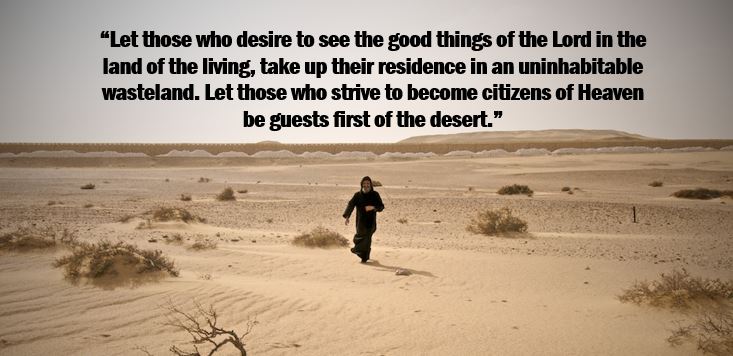I would say that the desert deserves to be called a temple of our God without walls. Since it is clear that God dwells in silence, we must believe that he loves the solitary expanses of the desert. Very often he has let himself be seen there by his saints; he willingly meets with people …
I would s ay that the desert deserves to be called a temple of our God without walls. Since it is clear that God dwells in silence, we must believe that he loves the solitary expanses of the desert. Very often he has let himself be seen there by his saints; he willingly meets with people in favorable places such as the desert. In the desert Moses gazed upon God until his face shone with glory. In the desert Elijah covered his face for fear of seeing God. Although God is present everywhere, and regards the whole world as his domain, we may believe that his preferred place is the solitudes of heaven and of the desert.
ay that the desert deserves to be called a temple of our God without walls. Since it is clear that God dwells in silence, we must believe that he loves the solitary expanses of the desert. Very often he has let himself be seen there by his saints; he willingly meets with people in favorable places such as the desert. In the desert Moses gazed upon God until his face shone with glory. In the desert Elijah covered his face for fear of seeing God. Although God is present everywhere, and regards the whole world as his domain, we may believe that his preferred place is the solitudes of heaven and of the desert.
The story is told that someone once asked a wise man where he could be sure to find God. The wise man told his questioner to come along where he would lead him, and together they went into the solitude of the open desert. ‘Behold’, he said:, ‘this is where God is’. God is more promptly believed to be there, since he is more easily found there.
At the beginning of creation when God created all things according to his wisdom and differentiated individual things in such a way that each would be suited to its future use, he did not leave the desert places of the world without honor; still, their worth was not immediately evident. I am convinced that God, in foreknowledge of the future, prepared the desert for the saints to come. I believe he wanted some parts of the world to be rich in the fruits of agriculture and other parts, with drier climate, to abound with holy men. In this way the desert would bear fruit. When he watered the hills from the heights above, the valleys were filled with plentiful crops. And he planned to endow the sterile deserts with inhabitants, lest any land go to waste…
Moses was tending his flock in the depths of the desert when in the distance he saw God gloriously in a shining fire that burned without consuming. Not only did he see God; he heard him speaking. The Lord commanded Moses to take off his sandals and then called the desert holy, saying, ‘The place where you stand is holy ground’. The merit and dignity of the desert had been hidden until that public pronouncement. Then God confirmed the sanctity of the place by making a holy covenant there. In my opinion, the lesson implicit here is that those who approach the desert should first unblock the path of their lives from the obligations of their previous concerns. They should proceed to the deserts only when they have taken off the sandals that impeded them, so that they will not profane the sacred place.
It was there in the desert that Moses first conversed with God. He received God’s words and spoke to him in reply. He asked questions and was instructed about what to do and say. He conferred with the Lord of Heaven in ordinary speech. It was there that Moses acquired a staff powerful in miraculous…
In the desert that nation (Israel) was sustained and favored by miracles. They lived on strange food, unexpected water, and clothing that never wore out. The very garments that clothed their bodies were miraculously preserved. Anything necessary that the nature of the land could not provide was supplied by the visible beneficence of God. Scarcely any of the saints have attained such gifts of heavenly grace. It is rightly said of this people, ‘The Lord has not dealt thus with any other nation’. The Lord gave them special favors and granted them unheard of things when he nourished his people with his divine gifts in the desert.
All these events are recorded as a sign of what happens to us, for the outward appearance of things shines with hidden mysteries. They were all baptised in Moses, in the cloud and in the sea, and they all ate the spiritual food and drank the spiritual drink. Nevertheless, these symbolic events remain true realities in themselves. So the desert still deserves to be praised even if the things done there must be understood as referring to deep mysteries. Grace is not offended in the least, even when we interpret that condition of body and incorruptibility of clothing as the ideal of eternal life. It was by the sheer gift of grace that the kind of happiness the blessed enjoy in the age to come was already possessed in the desert by those people in the present age…
Could the children of Israel not have come to the promised land without first living in the desert? In order for that people to take possession of the land ‘flowing with milk and honey’, they first had to possess this parched and sterile wilderness. From the dwelling places in the desert, the road lies always open to our true homeland. Let those who desire to see the good things of the Lord in the land of the living, take up their residence in an uninhabitable wasteland. Let those who strive to become citizens of Heaven be guests first of the desert.
Join Us: Sign Up Today!
Tags:











